-
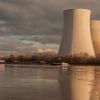 +17 +1
+17 +1Germany pledges to work towards nuclear-free EU on Fukushima anniversary
10 years after the nuclear meltdown in Fukushima that prompted Germany to confirm its prior nuclear phase-out decision, the environment ministry has published further steps necessary to reduce nuclear risk, including the use of nuclear energy in other countries. Environment minister Svenja Schulze said, it was a "myth" that the technology could help to find a way out of the climate crisis and stressed that investments should go into the further development of renewable energies instead.
-
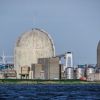 +28 +1
+28 +1Hackers breached a dozen US nuclear plants, reports say
Hackers breached at least a dozen US power plants in attacks in May and June, US media report, citing intelligence officials. The targets included the Wolf Creek nuclear facility in Kansas, according to several reports. An urgent Department of Homeland Security (DHS) report indicated a foreign power, possibly Russia, was responsible, the New York Times said.
-
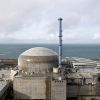 +11 +1
+11 +1Explosion at Flamanville nuclear power plant, several people injured
An explosion has erupted at EDF’s Flamanville nuclear power plant in northern France. At least five people suffered light injuries in the blast. EDF has confirmed that one reactor has been taken offline adding there is no nuclear risk. “It is a significant technical event, but it’s not a nuclear accident,” a representative of the local prefecture said, adding that the accident occurred outside of the ‘nuclear zone’.
-
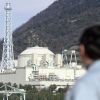 +32 +1
+32 +1Japan cancels failed $9bn Monju nuclear reactor
Japan is a scrapping an experimental reactor which has worked for just 250 days of its 22-year lifespan and cost $9bn (£7.2bn). The Monju reactor, in western Japan's Fukui city, was designed to burn most of its own spent fuel, eliminating the need to deal with the nuclear waste. But it suffered its first problems months after it went live, and has not worked properly since. It would now need billions more for safety upgrades to be restarted.
-
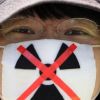 +26 +1
+26 +1Japan admits to cover-up in early days following Fukushima disaster
The utility that ran the Fukushima nuclear plant acknowledged Tuesday its delayed disclosure of the meltdowns at three reactors was tantamount to a cover-up and apologized for it. Tokyo Electric Power Co. President Naomi Hirose's apology followed the revelation last week that an investigation had found Hirose's predecessor instructed officials during the 2011 disaster to avoid using the word "meltdown." "I would say it was a cover-up," Hirose told a news conference. "It's extremely regrettable."
-
 +32 +1
+32 +1California utility to close Diablo Canyon nuclear reactors by 2025
The state’s last nuclear power plant has straddled geological and political fault lines.
-
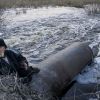 +43 +1
+43 +1Russia's nuclear nightmare flows down radioactive river
At first glance, Gilani Dambaev looks like a healthy 60-year-old man and the river flowing past his rural family home appears pristine. But Dambaev is riddled with diseases that his doctors link to a lifetime’s exposure to excessive radiation, and the Geiger counter beeps loudly as a reporter strolls down to the muddy riverbank.
-
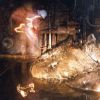 +40 +1
+40 +1The Famous Photo of Chernobyl's Most Dangerous Radioactive Material Was a Selfie
At first glance, it’s hard to know what’s happening in this picture. A giant mushroom seems to have sprouted in a factory floor, where ghostly men in hardhats seem to be working. But there’s something undeniably eerie about the scene, for good reason. You’re looking at the largest agglomeration of one of the most toxic substances ever created: corium.
-
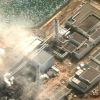 +20 +1
+20 +1Japan Regulators OK Costly Ice Wall at Fukushima Plant
Japanese regulators on Wednesday approved the use of a giant refrigeration system to create an unprecedented underground frozen barrier around buildings at the wrecked Fukushima nuclear plant in an attempt to contain leaking radioactive water. The Nuclear Regulation Authority said the...
-
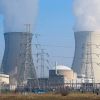 +27 +1
+27 +1Belgium Fears Nuclear Plants Are Vulnerable
As a dragnet aimed at Islamic State operatives spiraled across Brussels and into at least five European countries on Friday, the authorities were also focusing on a narrower but increasingly alarming threat: the vulnerability of Belgium’s nuclear installations. The investigation into this week’s deadly attacks in Brussels has prompted worries that the Islamic State is seeking to attack, infiltrate or sabotage nuclear installations...
-
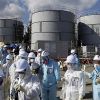 +46 +1
+46 +1Fukushima's ground zero: No place for man or robot
The robots sent in to find highly radioactive fuel at Fukushima's nuclear reactors have “died”; a subterranean "ice wall" around the crippled plant meant to stop groundwater from becoming contaminated has yet to be finished. And authorities still don’t know how to dispose of highly radioactive water stored in an ever mounting number of tanks around the site.
-
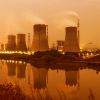 +6 +1
+6 +1Why America abandoned nuclear power (and what we can learn from South Korea)
There's a compelling argument that the world ought to be building many more nuclear power plants. We'll need vast amounts of carbon-free energy to stave off global warming. It's not at all clear that renewables can do the job alone. And nuclear is a proven technology, already providing 11 percent of electricity globally. So what's the catch? Cost. More than safety or waste issues, cost is nuclear's Achilles' heel. Modern-day reactors have become jarringly expensive...
-
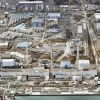 +47 +1
+47 +1Japan acknowledges possible radiation casualty at Fukushima nuclear plant
Japan on Tuesday acknowledged the first possible casualty from radiation at the wrecked Fukushima nuclear power plant, a worker who was diagnosed with cancer after the crisis broke out in 2011. The health ministry's recognition of radiation as a possible cause may set back efforts to recover from the disaster, as the government and the nuclear industry have been at pains to say that the health effects from radiation have been minimal.
-
 +23 +1
+23 +1Japan Reopens Town Shuttered By Fukushima Nuclear Disaster
The town of Naraha, which had 7,400 residents, was evacuated in the wake of a massive earthquake and tsunami in 2011 that triggered the release of radiation at the power plant. More than four years after the 7,400 residents of the Japanese town of Naraha were evacuated after the Fukushima Dai-ichi nuclear plant melted down in the wake of a devastating tsunami, the government is allowing people to return.
-
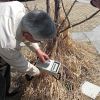 +21 +1
+21 +1Fukushima today: A first-person account from the field and the conference table
It has been more than four years since the east coast of Japan was hit with a trifecta: an earthquake of Magnitude 9 on the Richter scale, followed by a massive tsunami triggered by the quake’s tremors, and then the meltdown of three nuclear reactors in the Fukushima Daiichi nuclear generating complex.
-
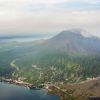 +32 +1
+32 +1Japan Volcano Alert Raised Near Nuclear Reactor
Sakurajima volcano is 31 miles from Sendai nuclear plant, which restarted one of its reactors this week after new safety rules.
-
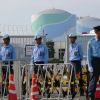 +28 +1
+28 +1Japan Restarts First Nuclear Reactor Since Fukushima Disaster
Sendai nuclear plant in southern Japan is first to begin operation since 2011 Fukushima meltdowns, despite anti-nuclear protests
-
 +14 +1
+14 +1Nuclear Expert: We should be very worried about ongoing catastrophe at Fukushima
… “Complete failure” of ice wall built to contain extremely radioactive water… Plutonium is flowing into Pacific, will for many years to come — Strontium in ocean hits record level, huge increase reported since April (VIDEO)
-
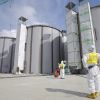 +7 +1
+7 +1No One Knows What to Do With Fukushima’s Endless Tanks of Radioactive Water
This is what passes for good news from Fukushima Daiichi, the Japanese nuclear power plant devastated by meltdowns and explosions after a cataclysmic earthquake and tsunami in 2011: By the end of last month, workers had succeeded in filtering most of the 620,000 tons of toxic water stored at the site, removing almost all of the radioactive materials. After numerous false starts and technical glitches, most of the stored water has been run through filtration systems to remove dangerous...
-
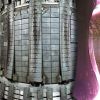 +8 +1
+8 +1Nuclear fusion, the clean power that will take decades to master
Why don't we have nuclear fusion power yet? Because it involves taming plasmas at temperatures far hotter than the Sun's core. But the good news is that physicists are slowly but surely figuring out how.
Submit a link
Start a discussion




















